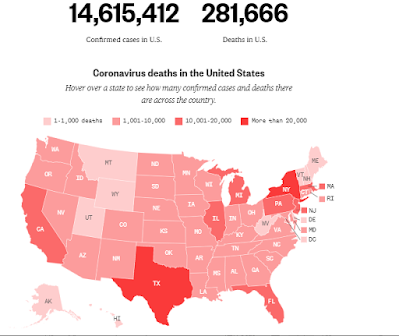Feel sick during this Covid pandemic and, naturally, one suspects the onset of Covid-19. Thursday evening my body began to ache – neck, back, hip joints, and a thumping headache.
Friday morning, I reviewed the list of Covid symptoms. My temperature was normal, no sore throat, no fever, no chills, no fatigue, no dry cough. The only symptom was body ache. No Covid toes. Judging by the wonderful wafts of jasmine and yesterday, today, and tomorrow blossoms, my sense of smell wasn’t affected. I had not contracted i-coronavirus, but a simple case of uyagula (“ya-goola”/sick).
News blues…
Notoriously recalcitrant with facing Covid realities, people of the United States are facing lockdowns that other countries, South Africa, for example, implemented months ago.
Governor of my home state, California, Gavin Newsom, yesterday announced a Regional Stay Home Order, where all sectors other than retail and essential operations would be closed in regions of the State where less than 15 percent of ICU beds are available. Health Officers announced the San Francisco Bay Area will implement the Regional Stay Home Order earlier, stating that more aggressive action is necessary to slow the surge and prevent our local hospitals from being overwhelmed. The new restrictions will go into effect in Alameda County on Monday, December 7, at 12:01 am and remain in place until January 4, 2021.
Under the Regional Stay Home Order, all private gatherings are prohibited and the following sectors must close:
• Indoor and outdoor playgrounds
• Indoor recreational facilities
• Hair salons and barbershops
• Personal care services
• Museums, zoos, and aquariums
• Movie theaters
• Wineries
• Bars, breweries, and distilleries
• Family entertainment centers
• Cardrooms and satellite wagering
• Limited services
• Live audience sports
• Amusement parks
The following sectors will have additional modifications in addition to 100% masking and physical distancing:
•
Outdoor recreational facilities: Allow outdoor operation only without any food, drink or alcohol sales. Additionally, overnight stays at campgrounds will not be permitted.
•
Retail: Allow indoor operation at 20% capacity with entrance metering and no eating or drinking in the stores. Additionally, special hours should be instituted for seniors and others with chronic conditions or compromised immune systems.
•
Shopping centers: Allow indoor operation at 20% capacity with entrance metering and no eating or drinking in the stores. Additionally, special hours should be instituted for seniors and others with chronic conditions or compromised immune systems.
•
Hotels and lodging: Allow to open for critical infrastructure support only.
•
Restaurants: Allow only for take-out, pick-up, or delivery.
•
Offices: Allow remote only except for critical infrastructure sectors where remote working is not possible.
•
Places of worship and political expression: Allow outdoor services only.
•
Entertainment production including professional sports: Allow operation without live audiences. Additionally, testing protocol and “bubbles” are highly encouraged.
Finally, glimpses of sanity…
***
The Lincoln Project:
Don’t go back (0:25 mins)
Pulpit (0:25 mins)
Healthy planet, anyone?
This is the year Americans learned how a food system reliant on industrial agriculture, near monopolies and exploited laborers breaks down. Just two months into the pandemic, the meat industry in the most powerful nation in the world was buckling.
Big questions: Can this food system be fixed?
Can farmers create a food system that works with the earth, not against it?
For all the consumer-facing, shrink-wrapped elegance of the modern food system, the pandemic has exposed its fragility.
Alongside the public health crisis, poverty and food insecurity have skyrocketed this year. As of July, 29 million Americans said they “sometimes or often” did not have enough to eat.
At the same time, Americans were confronted with images and stories of farmers forced to dump milk, destroy crops, and euthanize their livestock as processing facilities and restaurants shut down.
***
It’s not just the food system. It’s all systems with profit-first motives.
The biggest petroleum corporation in the world, Exxon, faces $20 billion hit from 'epic failure' of a decade ago.
Meanwhile, back at the ranch…
Today, I remain
uyagula, but less achy, and slightly less headachy. Now I worry about what might happen if I contracted Covid. My travel health insurance ran out months ago and my US-based health insurance is valid only in the US. I’ve no backup health insurance. This would mean any serious ill health would require going into debt for private hospital care or, horrors, partaking of the free but notoriously poor government health system. (One is advised to bring one’s own sheets and blankets for a stint in state hospitals – and to carry them with you to the toilet. Leaving bedclothes on the bed, even briefly, runs the risk of returning to a bare bed, bedclothes stolen.
Shaggy-dog story?
Am I willing to risk it?













